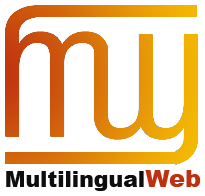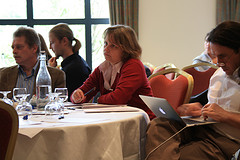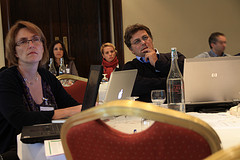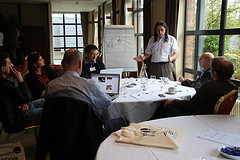
W3C Workshop, Call for Participation
New Horizons for the Multilingual Web
7 – 8 May 2014, Madrid
Important dates
| 19 Dec | Call for Participation issued |
|---|---|
| 14 Mar | Deadline for speaker proposals |
| 4 Apr | Acceptance notification sent |
| 8 Apr | Program released |
| 23 Apr | Sponsorship deadline |
| 7-8 May | Workshop 2014 |

Project funding
The LIDER project receives funding by the European Commission through the Seventh Framework Programme (FP7) Grant Agreement No. 610782.
Today, the World Wide Web is fundamental to communication in all walks of life. Although English once dominated the Web, other languages are increasing their presence, with long-term economic and social impacts. If the Web is to deliver its promised benefits and live up to the ideal of a single, world-wide network, it is vitally important to ensure the multilingual success of the World Wide Web.
The MultilingualWeb community develops and promotes best practices and standards related to all aspects of creating, localizing, and deploying the Web across boundaries of language. It aims to raise the visibility of existing best practices and standards for dealing with language on the Internet and on identifying and resolving gaps that keep the Internet from living up to its global potential.
The core vehicle for these actions is a series of events that started in 2010 (run by the initial MultilingualWeb Project and its successor, the MultilingualWeb-LT project). Following six highly successful events in Madrid, Pisa, Limerick, Luxembourg, Dublin and Rome, the seventh workshop will be held again in Madrid and hosted by the Universidad Politécnica de Madrid.
On this page: Participate • Goals, scope, audience • Venue and travel
Related links: Workshop report • Program • About W3C
How to participate
Participation is free. We welcome participation from both speakers and non-speaking attendees.
If you are interested in attending, please register as soon as possible.
The total number of participants will be limited, and registrations will be dealt with on a first come, first served basis. Registration may close early if the event is full. W3C membership is not required to participate in this workshop.
Presentations are typically limited to 15 minutes, however we may have a small number of longer talks during the workshop. Talks should describe standards and best practices relevant to the multilingual Web. Talks should ideally describe all of the following with relation to a given topic:
- existing best practices and/or standards that are relevant
- new standards and best practices that are currently in development
- gaps that are not covered by best practices and/or standards
If you wish to speak at the workshop, please fill in the registration form as soon as possible and provide a brief outline for your proposed talk at the appropriate place in that form. Based on a review of all submitted position papers, the Program Committee will select the most relevant and invite the submitters of those papers to speak at the event.
Speakers are asked to focus on describing practical ways of enabling people to meet the challenges of the multilingual Web, rather than to focus on technical details or specific products. Given the diversity of topics at the workshop, speakers should also pitch their talk at a level that will be understood by attendees who are unfamiliar with the topic area.
We are particularly interested in innovative, unusual, or first-time approaches to tackle known bottlenecks or gaps in the creation, localization, and deployment of multilingual Web content and services.
If you have any questions, please contact This email address is being protected from spambots. You need JavaScript enabled to view it. .
Goals, scope, and audience



As with previous MultilingualWeb events, this workshop will bring together speakers and participants with an interest in best practices and standards aimed at helping content creators, localizers, tools developers, and others meet the challenges of the multilingual Web. A unique proposition of the workshop is that it brings together speakers and provides opportunities for networking across a wide range of communities to produce a holistic view of the problems faced in developing and deploying multilingual content and applications on the Web.
In this workshop we wish to consider a wide spectrum of issues, ranging from blogs and social networking sites, to localization of large corporate or organizational enterprises. We are particularly interested in speakers who can identify gaps in standards and best practices related to the mutilingual Web, and propose opportunities for addressing those. Through these workshops, the European Commission wishes to promote widespread adoption of novel, innovative solutions, workflows, and approaches, and stimulate discussion concerning concrete proposals for future EU-funded actions in the field of multilingual technologies.
As part of the event, the LIDER project will organize a roadmapping workshop on linked data and content analytics. Details will be provided later.
Topics of interest for the MultilingualWeb workshop include, but are not limited to, the following:
Developers: Browser support; Web addresses (IRIs and IDNs); Web protocols (HTTP(s), IRC, REST, etc); Content formats (HTML, CSS, SVG, etc); Scripting languages (JavaScript, PHP, etc); Unicode; Locale data formats (CLDR, etc); Language and locale tags; Data feeds…
Creators: Content management and authoring tools; Browser support; Mobile Web; Voice on the Web; Language selection and navigation; Multilingual web sites; Usability and design for i18n…
Localizers: Localization standards and tools; Optimizing localization processes, workflows and business models; TM and terminology databases; Machine translation; Crowd-sourcing; Cloud based issues; Process enablers…
Users: Social Web (blogs, social media, etc.); Cultural topics; Minority languages; Accessibility…
Machines. Semantic web; RDF and multilingual Linked Open Data / Multilingual data sets; Multilingual web services; Language resources; Text mining; Language technologies; Search engine optimization; Web architecture and processes…
Policy makers. Why the multilingual web matters; Trends; Standards organization players; Political issues…
The workshop is expected to attract a broad set of stakeholders, including managers and practitioners working in the areas of content development, design, localization, and production management; developers of tools such as translation tools, content management systems, editors, etc; researchers and developers working with language technology and resources; browser implementors; standards and industry body representatives; and many more. The interchange of information and perspectives from this diverse group is expected to provide a more thorough picture of the existing landscape for multilingualism on the Web, and was one of the successes of the previous workshops.
Become a sponsor
W3C proposes a dedicated sponsorship program for these workshops to enable organizations to showcase their business and underscore their commitment to the shared goals of the W3C. The sponsorship benefits allow workshop sponsors to reach out to all stakeholders and decision makers worldwide and to be associated with breakthrough innovations that are paving the future of the Web.
Get more information about becoming a workshop sponsor. The deadline for sponsorship submissions for the Madrid workshop is 16 April, 2014.
Venue, hotels, and other workshop logistics
Important Dates
See the top of this page.
Workshop Venue
 The workshop will be hosted by the
Universidad Politécnica de Madrid (UPM) at the Escuela Técnica Superior de
Ingenieros de Telecomunicación (ETSIT), which is located in "Ciudad
Universitaria", a university campus in the west part of Madrid. See map 1.
The workshop will be hosted by the
Universidad Politécnica de Madrid (UPM) at the Escuela Técnica Superior de
Ingenieros de Telecomunicación (ETSIT), which is located in "Ciudad
Universitaria", a university campus in the west part of Madrid. See map 1.
The address of ETSIT-UPM is:
Escuela Técnica Superior de Ingenieros
de Telecomunicación
Avenida Complutense, 30
Ciudad Universitaria
28040 Madrid
Spain
Getting there
Local transport
ETSIT can be reached by bus, underground, or taxi. Bus line F comes from "Cuatro Caminos" (point 1 on map 2) and bus line 82 comes from "Moncloa" (point 2 on map 2). Both stop at ETSIT's entrance when coming from Cuatro Caminos or Moncloa. However, to take the bus in the return direction you must go to a different bus stop. See details on map 3.
In Madrid, the underground is usually called "El Metro". Metro tickets and bus tickets cost 1 € each. At underground stations you can buy a combined ticket called "metrobus" that is valid for ten trips (underground or bus) and costs 12,20€. If you go to/from the airport you have to pay another 3 euros. The Metro is closed at nights from 2 am to 6 am.
The underground station "Ciudad Universitaria", line 6, is the closest to ETSIT (1 km away approximately). Cuatro Caminos and Moncloa also have stations in the same line. See the complete map of underground lines. Very close to the "Ciudad Universitaria" station you can connect with bus lines 82, G or U, which stop at ETSIT's entrance.
Arriving in Madrid
The international airport Madrid-Barajas is located 12 km east of Madrid. See map 1. There are 4 terminals.
Terminals 1, 2 and 3 (T1, T2 and T3) are colocated and can be reached by metro with the underground station "Aeropuerto T1-T2-T3" (line 8), as well as bus line 200 which goes from terminals T1, T2, and T3 to "Avenida de América" (point 3 on map 2).
The new terminal 4 (T4 and its satellite T4S) is used by Iberia and other airlines. See list of airlines at each terminal. It can be reached also by metro with the underground station "Aeropuerto T4" (line 8). Bus line 204 goes from terminal T4 to "Avenida de América". Free shuttle buses link all four terminals.
The metro ticket when going or coming from the airport terminals cost 2€. If you go to the airport from the city, you should buy a special metro ticket for the airport (2€) instead of the normal one (1€).
If you take a taxi, the initial fare is 2,05 € (all days from 6 am to 9 pm), 2,20 € (Monday through Friday from 9 pm to 6 am) or 3,10 € (other times). The supplementary fare for trips from/to the airport is 5,5 €. There is no extra charge for luggage. The taxi tariff, shown in the taximeter, is "1" (0,98 €/km) Monday through Friday from 6 am to 9 pm and Saturdays from 6 am to 5 pm, or "2" (1,17 €/km) other times. To ask for a receipt say "Un recibo, por favor".
Hotels
There are no hotels within short walking distance of ETSIT. Hotel Tirol, Hotel Husa Moncloa, and Hotel NH Alberto Aguilera are located in "Moncloa", close to bus 82 stop. In the same area is Hotel Conde Duque.
Hotel AC Los Vascos and Hotel Jardin Metropolitano are near "Cuatro Caminos" and bus F stop.
Hotel Liabeny and Hotel Carlos V are closer to the city center. In this case, you can take the underground at station "Callao" (line 3).
More information
Interactive map - Metro - Bus - Taxi - Regional transport - Trains - Barajas Airport (AENA) - Weather forecast - Council of Madrid
Contact
- For questions about the program or the workshops in general, please contact This email address is being protected from spambots. You need JavaScript enabled to view it. .
- For assistance with local workshop logistics or technical issues, please contact Elena Montiel Ponsoda (until April 2014), This email address is being protected from spambots. You need JavaScript enabled to view it. , This email address is being protected from spambots. You need JavaScript enabled to view it. and This email address is being protected from spambots. You need JavaScript enabled to view it. .
Deliverables
Workshop sessions and documents will be in English. After the event presentations, minutes and the workshop report will be made available to the public, linked from the project site.
Co-chairs
- Felix Sasaki (DFKI / W3C Fellow)
- This email address is being protected from spambots. You need JavaScript enabled to view it. (DFKI)
Local Organizer
- This email address is being protected from spambots. You need JavaScript enabled to view it. (UPM)
Program Committee
- Clara Bacciu (Consiglio Nazionale delle Ricerche)
- Luis Bellido Triana (Universidad Politécnica de Madrid)
- Martin Brümmer (Universität Leipzig)
- Paul Buitelaar (INSIGHT)
- Aljoscha Burchardt (DFKI)
- Manuel Tomas Carrasco (Directorate-General for Translation, European Commission)
- Claudio Chiavetta (Lionbridge Belgium)
- Philipp Ciminao (University of Bielefeld)
- Ernesto William De Luca (University of Applied Sciences Potsdam)
- Thierry Declerck (DFKI)
- Pedro L. Díez Orzas (Linguaserve)
- Maud Ehrmann (University of Rome)
- David Filip (University of Limerick)
- Tatiana Gornostay (Tilde)
- Jorge Gracia (Universidad Politécnica de Madrid)
- Daniel Grasmick (Lucy Software)
- Marko Grobelnik (Jozef Stefan Institute)
- Sebastian Hellmann (Universität Leipzig)
- Ivan Herman (W3C)
- Richard Ishida (W3C)
- Dominic Jones (Trinity College Dublin)
- John Judge (Dublin City University)
- José Emilio Labra Gayo (University of Oviedo)
- Christian Lieske (SAP)
- Arle Lommel (DFKI)
- Andrea Marchetti (Consiglio Nazionale delle Ricerche)
- Charles McCathie Nevile (Yandex)
- Monica Monachini (Consiglio Nazionale delle Ricerche)
- Jan Nelson (Microsoft)
- Encarna Pastor (Universidad Politécnica de Madrid)
- Georg Rehm (DFKI / W3C Germany & Austria Office)
- Phil Ritchie (VistaTEC)
- Felix Sasaki (DFKI / W3C Fellow)
- Jörg Schütz (bioloom group)
- Ankit K. Srivastava (Dublin City University)
- Tadej Štajner (Jozef Stefan Institute)
- Dan Tufis (RACAI)
- Josef van Genabith (DFKI)
- Hans Uszkoreit (DFKI)
- Jeroen van Grondelle (HU University of Applied Sciences Utrecht)
- Cristina Valdés Rodríguez (Universidad de Oviedo)
- Daniel Vila (Universidad Politécnica de Madrid)
- Stephan Walter (Cocomore)






